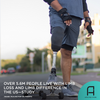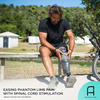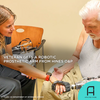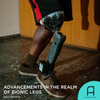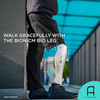Plastic Bottles Are Being Upcycled Into Low-Cost Prosthetic Limbs
Among the most pressing global issues that need to be addressed as soon as possible include the lack of affordable yet high-quality prosthetic limbs and excessive plastic waste. Researchers from De Montfort University (DMU) in Leicester, UK, hope to help solve both problems by creating artificial limbs out of plastic bottles.

The statistics on plastic waste is alarming. According to the World Wide Fund for Nature, approximately 8 million tons of plastic waste finds its way into the ocean every year. If we don’t find ways to reduce this number, there are bound to be serious consequences. On the other hand, the World Health Organization estimates that about 30 million people need prosthetic and orthotic devices. Still, more than 75% of developing countries don’t have the proper training programs, leading to inadequate clinical coverage of patients in need.
From plastic bottles to prostheses
Dr. Karthikeyan Kandan, a senior lecturer in mechanical engineering at DMU, found a way to turn plastic bottles into low-cost prosthetic limbs. First, the bottles are ground into powder, which is then spun into polyester yarns. When these yarns are heated, they produce a light yet durable material that’s also easy to mold into shape.
According to Dr. Kandan, this initiative aims to develop a new prosthetic limb that’s cost-effective but comfortable and sturdy at the same time. The research team also hopes that this new prosthesis will bridge the gap between expensive, high-performance limbs and affordable, lower performance limbs.
The recycled plastic prosthesis will be affordable but of good quality. Researchers are pegging to price a prosthetic socket at $12, compared with the going average price of more than $6,000.
In late 2019, the team carried out trials in India, where the weather is generally hot and humid. One of the participants, 22-year-old Anshul Bansal, said that the prosthesis is truly light and sweat-proof. Sweat is a chief concern for Bansal, who wears a below-the-knee prosthesis on the right leg, as it usually results in painful rashes. After the successful test in India, large-scale tests will be done in different countries.
The research team developed the upcycled prosthetics with support from the Global Challenges Research Funding, an organization that aims to address various issues faced by developing countries, and the Academy of Medical Sciences, an independent UK-based research body.
What do you think of this new development?


























